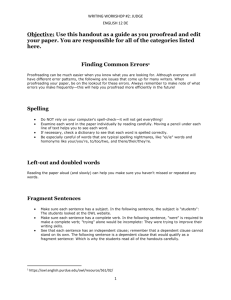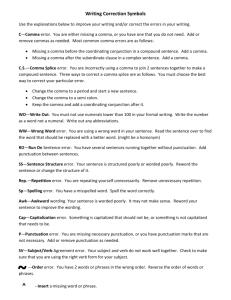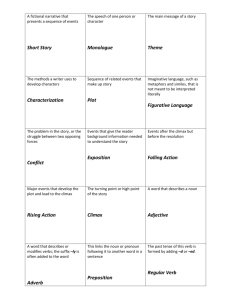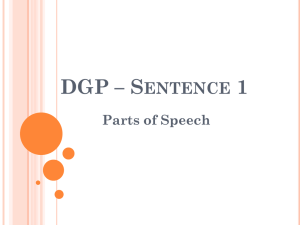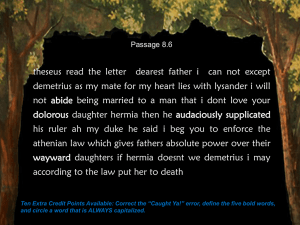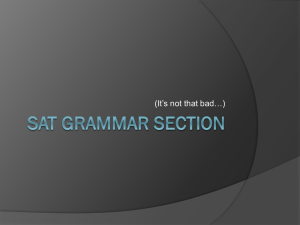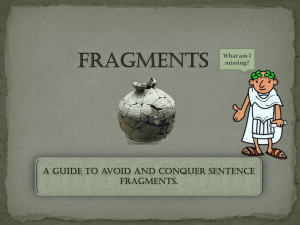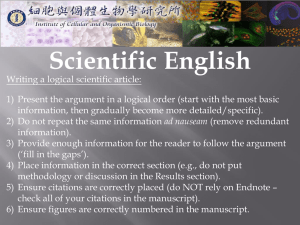10 Most Common Grammar Errors—and How to Avoid Them Error
advertisement
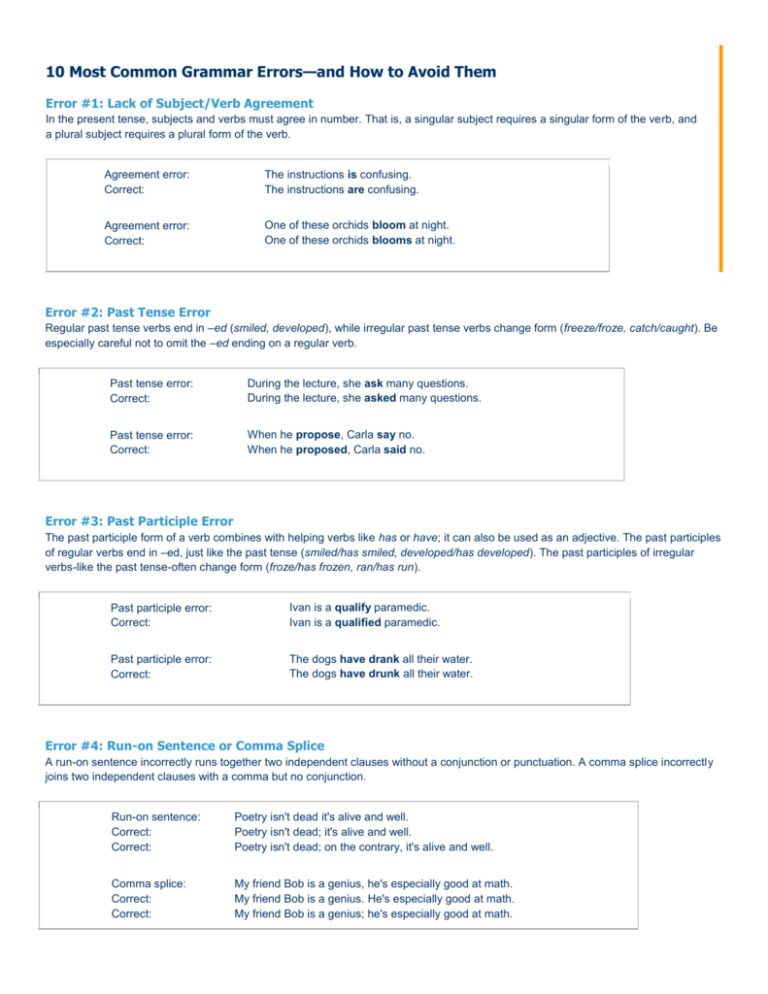
10 Most Common Grammar Errors—and How to Avoid Them Error #1: Lack of Subject/Verb Agreement In the present tense, subjects and verbs must agree in number. That is, a singular subject requires a singular form of the verb, and a plural subject requires a plural form of the verb. Agreement error: Correct: The instructions is confusing. The instructions are confusing. Agreement error: Correct: One of these orchids bloom at night. One of these orchids blooms at night. Error #2: Past Tense Error Regular past tense verbs end in –ed (smiled, developed), while irregular past tense verbs change form (freeze/froze, catch/caught). Be especially careful not to omit the –ed ending on a regular verb. Past tense error: Correct: During the lecture, she ask many questions. During the lecture, she asked many questions. Past tense error: Correct: When he propose, Carla say no. When he proposed, Carla said no. Error #3: Past Participle Error The past participle form of a verb combines with helping verbs like has or have; it can also be used as an adjective. The past participles of regular verbs end in –ed, just like the past tense (smiled/has smiled, developed/has developed). The past participles of irregular verbs-like the past tense-often change form (froze/has frozen, ran/has run). Past participle error: Correct: Ivan is a qualify paramedic. Ivan is a qualified paramedic. Past participle error: Correct: The dogs have drank all their water. The dogs have drunk all their water. Error #4: Run-on Sentence or Comma Splice A run-on sentence incorrectly runs together two independent clauses without a conjunction or punctuation. A comma splice incorrectly joins two independent clauses with a comma but no conjunction. Run-on sentence: Correct: Correct: Poetry isn't dead it's alive and well. Poetry isn't dead; it's alive and well. Poetry isn't dead; on the contrary, it's alive and well. Comma splice: Correct: Correct: My friend Bob is a genius, he's especially good at math. My friend Bob is a genius. He's especially good at math. My friend Bob is a genius; he's especially good at math. Correct: My friend Bob is a genius, and he's especially good at math. Error #5: Sentence Fragment A sentence fragment lacks a subject, a verb, or both. It cannot stand alone as a sentence. Sentence fragment: Correct: The dance troupe that visited our campus. The dance troupe that visited our campus was inspiring. Sentence fragment: Correct: Studying all night long. We stayed up studying all night long. Sentence fragment: Correct: Because he is allergic to peanuts. Because he is allergic to peanuts, he cannot eat that sandwich. Error #6: Pronoun Error The most common pronoun errors are pronoun/antecedent agreement errors and case errors. Pronouns must agree in number with the noun (the antecedent) to which they refer. If that noun is singular, the pronoun must be singular; if that noun is plural, the pronoun must be plural. Pronoun error: Correct: Everybody needs to bring their own canteen. Everybody needs to bring his or her own canteen. Pronoun case refers to the different forms of pronouns, which depend upon their parts of speech in a sentence. Pronoun error: Correct: There is a strong bond between he and I. There is a strong bond between him and me. Pronoun error: Correct: Her and me will be taking turns driving. She and I will be taking turns driving. Error #7: Apostrophe Error Use apostrophes to show possession: add 's after a singular noun or plural noun not ending in –s ; add ' after a plural noun ending in –s. Do not use an apostrophe after a possessive pronoun (my, mine, our, ours, his, hers, its, their, theirs). Apostrophe error: Correct: His parent's cabin is in Utah. (two parents) His parents' cabin is in Utah. Apostrophe error: The company is moving it's headquarters. Correct: The company is moving its headquarters. Error #8: Comma Error Watch out for these most common comma errors. 1. Missing commas in a series of items Comma error: Correct: 2. A missing comma after an introductory dependent clause Comma error: Correct: 3. I ordered a salad hamburger and French fries. I ordered a salad, hamburger, and French fries. Because he is ill he will not golf today. Because he is ill, he will not golf today. A missing comma between two independent clauses joined by a coordinating conjunction Comma error: Correct: 4. Stars and planets fascinate her so she wants to be an astronomer. Stars and planets fascinate her, so she wants to be an astronomer. Missing commas in nonrestrictive clauses Comma error: Correct: My car which is a Volkswagen gets good gas mileage. My car, which is a Volkswagen, gets good gas mileage. Error #9: Illogical Verb Tense Shift A verb tense shifts occurs when the writer switches from present to past or from past to present without a good reason. Tense shift: Correct: Correct: We drove to the lake, and Joe dives right in. We drove to the lake, and Joe dove right in. We drive to the lake, and Joe dives right in. Error #10: Misplaced or Confusing Modifier To avoid confusion, modifiers must be placed next to the word they modify and must clearly refer to a word in the sentence. Misplaced modifier: Correct: At five years old, my father taught me to ski. When I was five years old, my father taught me to ski. Confusing modifier: Correct: Strip mining the hillsides, many acres were left bare. Strip mining the hillsides, the coal company left many acres bare.

